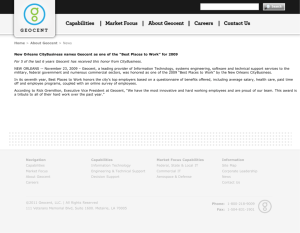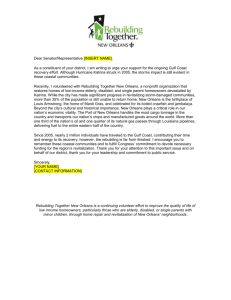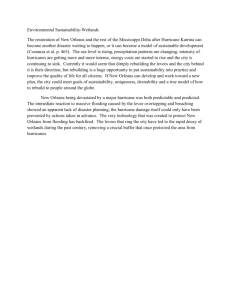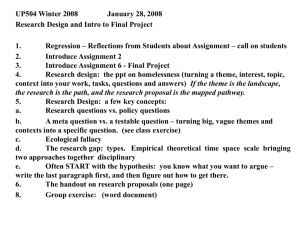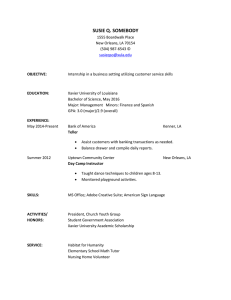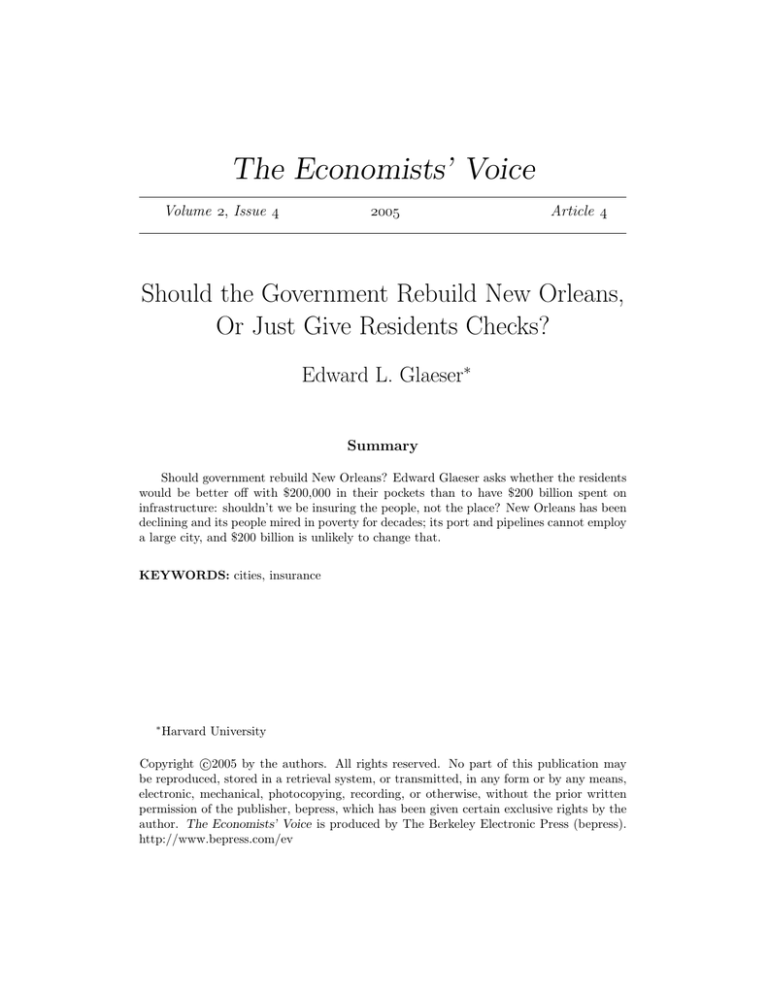
The Economists’ Voice
Volume , Issue
Article
Should the Government Rebuild New Orleans,
Or Just Give Residents Checks?
Edward L. Glaeser∗
Summary
Should government rebuild New Orleans? Edward Glaeser asks whether the residents
would be better off with $200,000 in their pockets than to have $200 billion spent on
infrastructure: shouldn’t we be insuring the people, not the place? New Orleans has been
declining and its people mired in poverty for decades; its port and pipelines cannot employ
a large city, and $200 billion is unlikely to change that.
KEYWORDS: cities, insurance
∗
Harvard University
c
Copyright 2005
by the authors. All rights reserved. No part of this publication may
be reproduced, stored in a retrieval system, or transmitted, in any form or by any means,
electronic, mechanical, photocopying, recording, or otherwise, without the prior written
permission of the publisher, bepress, which has been given certain exclusive rights by the
author. The Economists’ Voice is produced by The Berkeley Electronic Press (bepress).
http://www.bepress.com/ev
Glaeser: Should the Government Rebuild New Orleans, Or Just Give Residents
1
In the wake of Hurricane Katrina, President Bush declared that a “Great City
Will Rise Again.” He promised, “Throughout the area hit by the hurricane, we
will do what it takes—we will stay as long as it takes—to help citizens rebuild
their communities and their lives.”
Lawmakers have stumbled over each other to suggest greater and greater public
spending to rebuild New Orleans. While details remain to be settled, the current
estimates are that federal spending will be close to $200 billion.
Senator Edward Kennedy has proposed a $150 billion agency specifically
dedicated to Gulf area infrastructure. This spending is being justified as federal
insurance against disaster.
But the concept of insurance, hardly leads inexorably to the conclusion that the
government must spend money directly to rebuild New Orleans. To the contrary,
if there is disaster insurance, then it is, presumably, the people of New Orleans
who are insured, not the place itself. After all, people (or corporations) hold
insurance; places don’t.
It Seems Clear The Government Will Pay to Rebuild. But How, Exactly?
Economists emphasize the moral hazard problems in providing free disaster
insurance to high risk areas. Gary Becker has argued, for example, that free
insurance creates a “Good Samaritan” problem that encourages bad location
decisions.
As a matter of economic principle, Becker is surely right. Going forward,
residents of high risk areas should—from an economic efficiency perspective—be
charged for the implicit federal insurance that they receive. But politically, given
Florida’s status as a battleground state, this isn’t likely.
Moreover, even if we agree that in the future we should not distort location
decisions by providing free insurance, we should presumably still fulfill the
current obligations to the residents of New Orleans. And politicians have
promised to do just that.
So for the moment, let’s accept the principle that the federal government has—
wisely or not— insured against disasters. That principle still tells us little about
how, exactly, these insurance claims should be paid out.
Produced by The Berkeley Electronic Press, 2005
2
The Economists' Voice
Vol. 2 [2005], No. 4, Article 4
Should the Government Rebuild, Or Should Residents Get Checks or
Vouchers?
We could try to make good on the idea that the government provides insurance by
rebuilding the city. Alternatively, we could provide residents with checks or
vouchers, and let them make their own decisions about how to spend that
money—including the decision about where to locate, or relocate, themselves.
When your car is damaged you can often “cash out” and receive cash to do with
as you wish instead of having your car repaired. And, when your car is “totaled,”
the insurance company generally won’t fix your car at all, it will only provide
cash compensation, and you decide how to spend it.
In the context of the President’s comments, there is a big difference between
rebuilding lives and rebuilding communities. Given limited funds, the two
objectives may well conflict, and the usual lesson from economics is that people
are better off if they are given money and allowed to make their own decisions,
much as they are with car insurance.
The case for rebuilding New Orleans, then, depends on whether the residents of
New Orleans will be made better off by this spending, than by being given checks
or vouchers.
Vouchers or Checks Would Be Life-Changing For Poor New Orleans
Residents
To put the numbers in context, imagine that we were to spend $100 billion dollars
on infrastructure for the residents of the city. An alternative to this spending is to
give each one of the city of New Orleans’ residents a check for more than
$200,000.
Annual per capita income in that city is less than $20,000, so this check would
amount to ten years’ income, on average—a hefty, and potentially life-changing
sum. That is enough to send several children to college, to buy a modest home,
and/or to relocate and start a dreamed-of business.
If this money were spread over the 1.33 million residents in the New Orleans
metropolitan area, each resident would still receive $75,000, still enough to pay
for a home in many areas of the country.
http://www.bepress.com/ev/vol2/iss4/art4
Glaeser: Should the Government Rebuild New Orleans, Or Just Give Residents
3
Can the benefits to the residents’ of local infrastructure possibly equal the benefits
for receiving three or ten years’ income as a lump sum? One has to wonder.
Could Public Spending Possibly Benefit Residents More than Checks or
Vouchers Could?
Indeed, there are many reasons to suspect that spending vast sums to rebuild the
city may not make sense. New Orleans is like many great American cities that
were built during previous eras and have become somewhat obsolete.
Before 1900, moving goods by water was much cheaper than moving goods by
land. As a result, all of the great American cities were built on rivers, or where an
important river meets the sea. From that perspective, the location of New Orleans
was unbeatable: it is the port at the mouth of America’s greatest river system.
New Orleans reached its peak of economic importance relative to the U.S. in
1840. But the Civil War and the relative decline of water-based transportation
relative to rail caused the city to lose ground, relative to Northern cities, through
much of the Nineteenth century.
In 1840, New Orleans was America’s third largest city (after New York and
Baltimore); by 1920, it had dropped to being only its seventeenth largest city.
Still, the city’s edge as a port continued to ensure that its population increased
until the 1950s.
New Orleans began to decline, in absolute terms, in 1960. The port remains
important, but increasing mechanization and containerization, together meant that
fewer and fewer people were needed to work in that port. Today, according to the
2003 County Business Patterns, less than one-twentieth of the employees in New
Orleans are in transportation industries, and more than a quarter of these aren’t
even working in the port or pipelines.
Even the vaunted energy industry employs a remarkably small number of people.
County Business Patterns reports that there are fewer than 2,000 people in New
Orleans working in oil and gas extraction, and fewer than 100 people working on
pipeline transportation.
While there are fewer than 7500 people working in the port, there are 32,000
employees in health care and social assistance. New Orleans’ biggest industry is
Produced by The Berkeley Electronic Press, 2005
4
The Economists' Voice
Vol. 2 [2005], No. 4, Article 4
tourism, and there are 37,000 employees working in food services and
accommodation.
New Orleans remains an important port, but this port doesn’t need a large city,
and over time, the city has contracted. New Orleans’ population has declined
steadily—from 627,000 residents in 1960 to 485,000 residents in 2000.
If the American Community Survey is to be believed (this is based on a smallish
sample), New Orleans has lost another 40,000 inhabitants between 2000 and
2004. The 4.1 percent growth of the New Orleans metropolitan area in the 1990s
put it far below the average U.S. population growth. It is hard to find a sunbelt
city that is doing as badly as New Orleans.
All of this information cuts strongly against any claim that the rebuilding of New
Orleans would be more beneficial for its residents, than their receiving a large
check or voucher that would enable them not only to rebuild, but to transform,
their lives.
Could New Orleans, with Spending, Somehow Return to Its Long-Past
Glory?
Granted, some previously great ports have managed to rebuild themselves around
new industries. New York is now devoted to finance. San Francisco is the center
for information technology.
But New Orleans was never able to reinvent itself, perhaps because it lacked the
human capital that has been so heavily correlated with urban success over the past
50 years.
Moreover, New Orleans’ port locale raises construction costs, relative to, say, the
flat, featureless plains of Las Vegas. And New Orleans’ climate is problematic
relative to California. My own guess is that the city would have declined by more
than it has, if it were not for the durability of its housing stock and other
infrastructure. And now, thanks to Hurricane Katrina, that last asset has been
decimated.
Nor was New Orleans’ housing stock very valuable, in the market, to begin with.
The decline in New Orleans’ population has been accompanied by economic
distress and by low housing prices.
http://www.bepress.com/ev/vol2/iss4/art4
Glaeser: Should the Government Rebuild New Orleans, Or Just Give Residents
5
The 2000 Census reported that more than 27 percent of New Orleans residents
were in poverty (relative to 12 percent for the U.S. as a whole). Median family
income was only 64 percent of the median family income in the U.S.
In 2004, according to the American Community Survey, the unemployment rate
for the city was over 11 percent. And New Orleans’ housing prices, prehurricane, remained far below those of the nation as a whole, providing further
evidence of weak pre-existing demand for living in the city.
By most objective measures, the city, pre-hurricane, was not doing a good job of
taking care of its poorer residents. For most students of urban distress, New
Orleans was a problem, not an ideal. Poverty and continuing economic decline
fed upon each other, delivering despair to many of the city’s residents.
More Limited Rebuilding, Combined with Aid to Residents, May Be Wiser
New Orleans’ decline suggests that spending huge sums betting on the future of
the city makes little sense. Perhaps there are externalities or coordination failures
that argue for rebuilding, but they do not immediately come to mind.
Most sensible theories about externalities suggest that giving checks to impacted
residents, who then will move to Houston or Atlanta or Las Vegas, will actually
reduce the negative spillovers from dysfunctional neighborhoods—not increase
them.
None of this means, of course, that we shouldn’t rebuild New Orleans’ port or its
pipelines. But rebuilding this basic infrastructure doesn’t mean rebuilding the
entire city, and it doesn’t necessarily require federal funding.
The port and the energy sector are thriving economic entities. Their users can be
charged for the costs of this infrastructure. We will all eventually pay those costs
in the form of higher prices, but this is surely more efficient than funding
reconstruction with tax dollars.
Rebuilding New Orleans requires a cost-benefit analysis that is far behind the
scope of this essay. At this point, the only thing that I strongly endorse is having
an open-minded national debate about costs and benefits. However, I suspect that
for much of the proposed rebuilding, the costs will greatly outweigh the benefits.
Produced by The Berkeley Electronic Press, 2005
6
The Economists' Voice
Vol. 2 [2005], No. 4, Article 4
One of the biggest problems of urban decline is how to help those residents
caught in a declining city. Perhaps, if significant funds are given to New Orleans
residents to help them start life anew in some more vibrant city, then there will be
a silver lining to Katrina after all.
Edward Glaeser is Professor of Economics and Director of the Rappaport
Institute for Greater Boston and the Taubman Center for State and Local
Government at Harvard University.
Letters commenting on this piece or others
http://www.bepress.com/cgi/submit.cgi?context=ev
may
be
submitted
at
References and Further Reading.
Becker, Gary at
http://www.becker-posner-blog.com/archives/2005/09/major_disasters.html
(discussing the Good Samaritan problem).
Glaeser, Edward and Janet Kohlbase, "Cities, Regions and the Decline of
Transport Costs" Papers in Regional Science 83(1) (2004): 197-228.
Glaeser, Edward and Joseph Gyourko, "Urban Decline and Durable Housing"
Journal of Political Economy 113(2) (2005): 345-375.
U.S. Census at
http://factfinder.census.gov/servlet/SAFFFacts?_event=Search&geo_id=&_geoC
ontext=&_street=&_county=new+orleans&_cityTown=new+orleans&_state=040
00US22&_zip=&_lang=en&_sse=on&pctxt=fph&pgsl=010 (giving demographic
facts).
U.S. Census at
http://www.census.gov/population/www/documentation/twps0027.html
historical facts on city sizes).
(giving
U.S. Census, County Business Patterns at
http://censtats.census.gov/cgi-bin/cbpnaic/cbpsect.pl. (giving local statistics by
sector).
http://www.bepress.com/ev/vol2/iss4/art4

